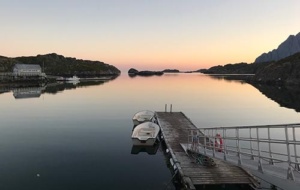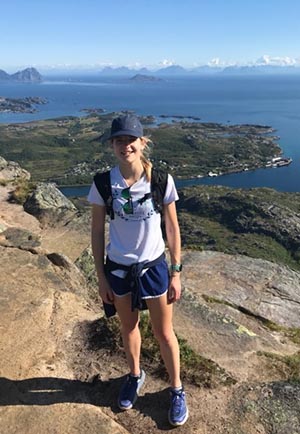4th International Immunology Workshop
 Old Members’ Trust Graduate Conference and Academic Travel Fund Report – Esther Jones (2020, DPhil in Molecular and Cellular Medicine)
Old Members’ Trust Graduate Conference and Academic Travel Fund Report – Esther Jones (2020, DPhil in Molecular and Cellular Medicine)
Many thanks to the generous support of the University College Old Members’ Trust Graduate travel fund. This funding enabled me to attend the 4th International Immunology Workshop, entitled “Molecular control of immune cell activation in health and disease”. The workshop was held in Lofoten, a Norwegian archipelago located north of the arctic circle, from 24-28 August, 2023.
The aim of the workshop was to bring together immunology scientists from Europe and beyond, representing all career stages, to share their work and collaborate for future international scientific efforts. This is particularly important in-light of the Covid pandemic, and thus this workshop aimed to strengthen existing collaborations and aid discussions for new avenues of research.
Travel started early with a 2am bus from Oxford to Heathrow. Then flights to Oslo for a connecting flight to Bodø in northern Norway. We were registered at the airport and travelled via the fjords on a chartered catamaran boat to Kabelvåg, Lofoten. We were staying in traditional fisherman’s cabins (Rorbuer), sharing rooms with other workshop attendees, with the most beautiful views over the fjord.
The workshop programme started each morning with talks from PIs, postdocs and PhD students, presenting on a huge variety of subjects including; T- and B-cell receptor antigen recognition, innate immunity, soluble B-cell receptors and vaccine immune responses. I was invited to present my PhD work within the “soluble B-cell receptor” section of the programme. The opportunity to present and receive feedback on my PhD work was incredibly valuable, and follow-up discussions about my work continued throughout the conference. The advice I received will prove useful in guiding my future avenues of research.
We also had an afternoon round-table discussion (with coffee and “lefse”, a sweet Norwegian flatbread) in small groups. Here we discussed various pertinent, current topics in immunological research. I was in a group discussing the use of animal models, a topic which has become more important in recent years due to ethical concerns, the rise of artificial intelligence, and questions about the relevance of animals to accurately model human disease.
 Beyond the science, we had optional organised activities each afternoon, which facilitated getting to know each other in a more relaxed setting. I opted for both the hikes up nearby mountains (approx. 420m elevation). The weather was very kind to us and the views of the surrounding mountains and fjords stunning. On these hikes I was able to chat to scientists in various stages of their scientific careers which I found very useful as I consider my own future career in academia. The evenings were reserved for dinner (including lots of fish soup, using locally caught fish) and then poster sessions. Many also stayed up late into the night to watch the northern lights which were visible on a couple of the days. The trip ended with swimming in the fjord, using the on-site sauna and hot-tub, having a formal evening dinner and enjoying a disco. What a way to end this wonderful experience in Lofoten!
Beyond the science, we had optional organised activities each afternoon, which facilitated getting to know each other in a more relaxed setting. I opted for both the hikes up nearby mountains (approx. 420m elevation). The weather was very kind to us and the views of the surrounding mountains and fjords stunning. On these hikes I was able to chat to scientists in various stages of their scientific careers which I found very useful as I consider my own future career in academia. The evenings were reserved for dinner (including lots of fish soup, using locally caught fish) and then poster sessions. Many also stayed up late into the night to watch the northern lights which were visible on a couple of the days. The trip ended with swimming in the fjord, using the on-site sauna and hot-tub, having a formal evening dinner and enjoying a disco. What a way to end this wonderful experience in Lofoten!
Find out more about the range of travel grants and scholarships available to assist Univ students on our Travel Grants page or read further travel reports.
Published: 21 November 2023
